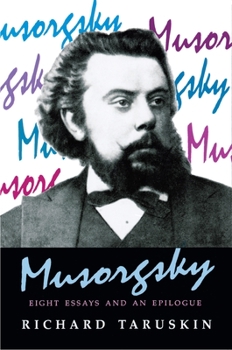Musorgsky: Eight Essays and an Epilogue
Select Format
Select Condition 
Book Overview
"It is a] fully illuminated story that Richard Taruskin, in the path-breaking essays collected here, unfolds around Modest Musorgsky, Russia's greatest national composer. . . . Taruskin's] tour de force comes with a frontal attack on all the Soviet-bred truisms that for a century have refashioned Musorgsky from what the evidence suggests he was--an aristocrat with an early clinical interest in true-to-life musical portraiture and a later penchant...
Format:Paperback
Language:English
ISBN:0691016232
ISBN13:9780691016238
Release Date:July 1997
Publisher:Princeton University Press
Length:449 Pages
Weight:1.47 lbs.
Dimensions:1.1" x 6.1" x 9.2"
Customer Reviews
2 ratings
Mighty Musorgsky
Published by Thriftbooks.com User , 15 years ago
Before I'll make some critical notions on this book I have to confess how much I enjoyed reading this book. This book, like the other books by Taruskin is academic literature at its best. Not only profound, detailled and knowledgable but also driven by curiosity and passionate interest in his subject. And I wouldn't even consider my objections against many of his assumptions as something to be put against this book. I prefer being confronted with some controversial theories to boring middle of the road literature. Already the title of the introduction "Who Speaks for Musorgsky?" made me a little resentful and is somehow symptomatic for the case Musorgsky. Why is it that everybody feels invited to either speak for him or school him like a dependent boy? Balakirev, Cui and Rimsky did, and even his friends and supporters Stasov and Kutuzov loved to do it. Taruskin decided that Kutuzov speaks more for Musorgsky than Stasov since this fits better to his revisionist thesis. The truth is that they all first speak for themselves. Stasov projects his revolutionary ideas on him like Kutuzov his reactionary aristocratic ideals. Cui wants to demonstrate his intellectual and Rinsky his technical superiority. And of course the soviet propaganda used him for their prposesas well. I would say that even the Musorgsky of the letters is not always speaking for Musorgsky since his hypersensitive and conflict avoiding character often made him write rather what his addresser wanted to hear than what he really thought. The only thing that speaks truthfully for Musorgsky is his music. The underlying thesis of this book or at least some chapters (the book is a selection of essays written at different times and occasions) is, as already hinted in the introduction, that Musorgsky was only a revolutionary in the early years of the "Marriage" and the "Ur-Boris" but became more and more conventional not to say reactionary already with the revision of Boris. I completely agree with the observation that there is this change from a more recitative dialogue style to more coherent musical entities. But to say one thing is the right way the other the false (compromising) way is a little bit too simple for my taste. Not only that other composers made this experience as well that the recitative style has its limiations. Wagner turned back after the "Rheingold" which represents his theory of Leitmotivtechnik in the purest form. Debussy wanted to overcome his loose Pelleas style in his planned (but unfortunately never realized) later opera projects. And also Ravels two small operas reflect this experience. The Ur-Boris definitely has its merits and is by no means defective. However, the additions of the revision process, mainly the "Polish act" and the "Kromy scene", may not be necessary for the plot, but are much more than just giving in to opera conventions. They add new dimensions to the epic feel of the opera. Besides that I would not want to miss the fountain scene, with its
Musorgsky Done Right
Published by Thriftbooks.com User , 24 years ago
Musorgsky has been the subject of a variety of interpretations for so long through many cultural regimes. Taruskin sets the record straight. The essays are all excellent in spite of the technical analysis at times, which is not a hindrance to the lay person. Most enjoyable is his essay on the origin and spelling of Musorgsky's name, another cultural puzzle solved. Now, how about a comprehensive overview of Russian musical history?






